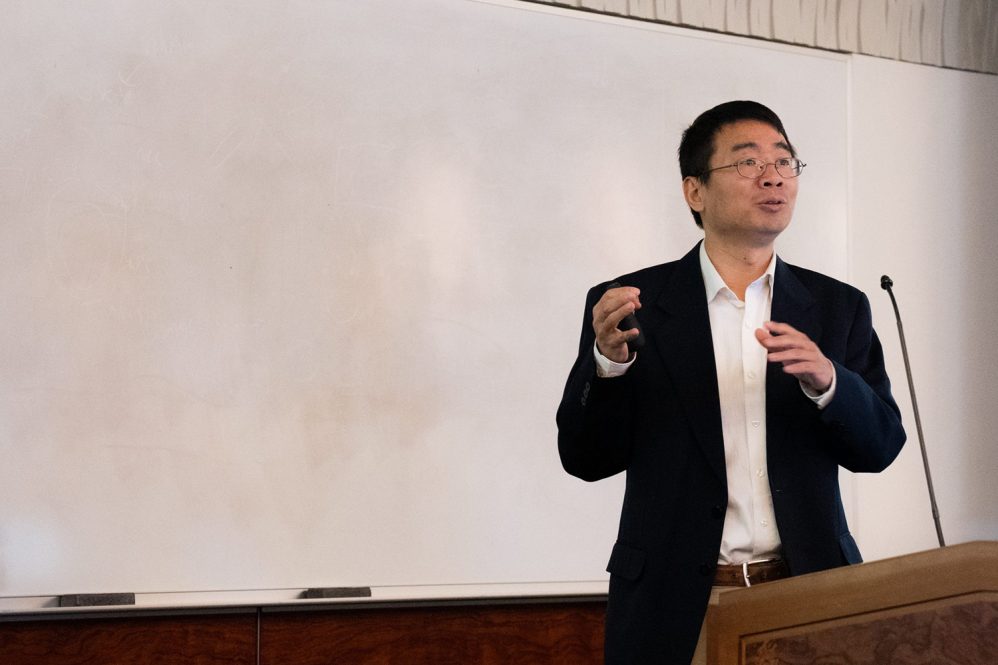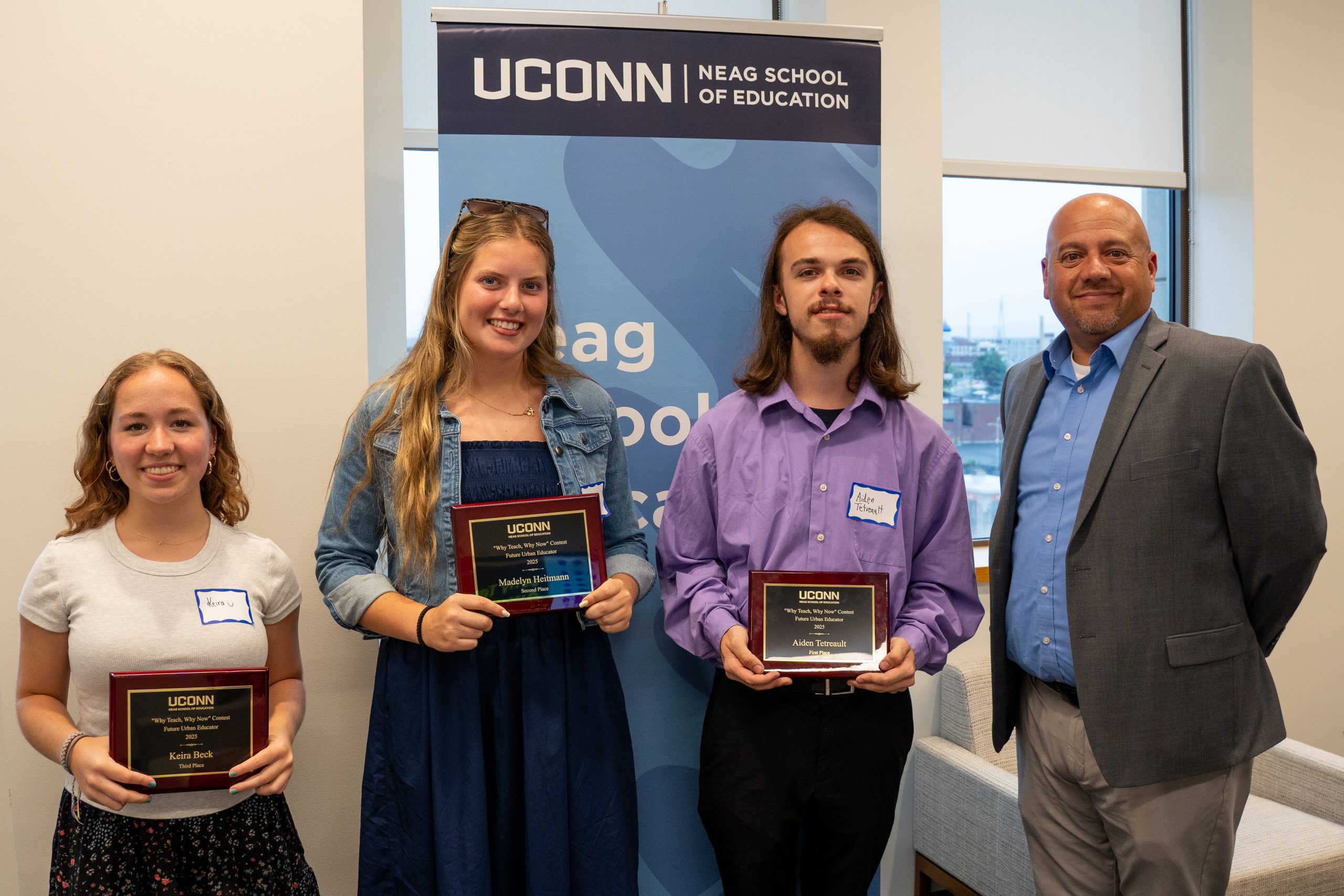In the two years since UConn Research fine-tuned its SPARK Technology Commercialization Fund, the faculty recipients have made significant progress on inventions designed to improve health and manufacturing.
In the process, camaraderie has developed between the members of the cohort of awardees and the team at UConn Technology Commercialization Services (TCS) that helps shepherd the process of translating invention to entrepreneurial success.
On May 4, several UConn researchers presented their advancements during an event at the Technology Incubation Program’s Farmington location. The presenters were members of the first cohort of faculty to receive funding through the revised SPARK program, which is designed to help translate research discoveries into products, processes, and commercial applications.
“Research leads to invention, and the technologies that our faculty members and students develop display the true ingenuity that UConn has to offer,” said Pamir Alpay, UConn’s interim vice president for research, innovation, and entrepreneurship. “SPARK has proven to be a very successful internal funding program that encourages innovation and helps bring these life-changing technologies to market. It’s inspiring to see the advancements of our SPARK awardees and I look forward to many more success stories.”
To date, UConn has awarded about $2.5 million in seed funding to dozens of SPARK recipients. UConn Research provides $50,000 a year to awardees and offers venture experts and specialists to help bring products to market, as well as assist seek additional investors and funding opportunities.
In 2021, the program was revised and retooled to support technology closest to marketability, ensuring sufficient funding support to move from concept to delivery. SPARK also focused on projects with strong interdisciplinary connections and increased the funding period from one to two years.
All five members of the first cohort to receive the SPARK funding under the revised criteria reported significant advancements in their products and concepts. They include:
- Chemistry associate Professor Eugene Pinkhassik, who is researching palladium-catalyzed reaction in continuous manufacturing;
- Chemical and biomolecular engineering Professor Sun Luyi, a researcher of high performance nanocoatings;
- Allied health sciences associate Professor Laijun Lai, who is developing antitumor immunotherapy techniques;
- Pharmaceuticals associate Professor Raman Bahal, a researcher developing targeted delivery of miRNA inhibitors in the kidneys and liver; and
- Biomedical engineering associate Professor Ali Tamayol, an inventor of a handheld foaming and printing device designed to treat soft tissue injuries
“Seeing is believing and you’ve just witnessed what we are doing at UConn,” said Abhijit Banerjee, UConn’s associate vice president for research innovation and entrepreneurship. “This is just a showcase of a very small cross section of faculty and startups that we want to share with you.”
Additionally, two TIP startups presented their own progress: Encapsulate, a company seeking to transform cancer therapy through biochip technology; and SingleTimeMicroneedles, which develops less painful drug delivery methods for humans and pets.
Afterward, SingleTimeMicroneedles’ CEO Jasdeep Singh ’02 (CLAS) ’21 (BUS) explained the benefits of networking with other TIP companies, as well as the significant overhead costs his company saves by working with UConn in dedicated lab space.
“I see UConn as an equal partner now in building this company,” Singh said. “What can I do to help you and what can I do to help advance your goals.”
A Network of Support
Banerjee said that TCS is working with the CEOs and inventors to create a network of support and a chance to “cross-pollinate” ideas. In fact, the SPARK recipients have already formed a network of sorts, one that is blending individual accomplishments and advancements with the resources that TCS provides.
“One of the biggest takeaways from the SPARK program is the interdisciplinary nature of the research and the potential for collaboration between the five awardees,” said Vivek Ramakrishnan, director of Venture Development for TCS. “The goal of the SPARK program is to create a cohort of like-minded professors that will mentor each other and the new SPARK awardees in succeeding years. We believe this will spur innovation at UConn by creating inter-disciplinary collaborations.”
Singh said TIP companies work together in a similar fashion. They are not competitors, but rather a valuable resource to each other as they build their businesses and develop their technologies.
2023 SPARK Awardees
At the event, UConn manager of Research Development Services Matthew Mroz announced the most recent SPARK recipients. The following four faculty members and their teams will each receive $50,000 in first-year funding for their respective projects:
- Biomedical engineering associate Professor Yupeng Cheng, for commercialization of an ambient temperature-stable mRNA delivery technology;
- Chemistry associate Professor Jessica Rouge, for nucleic acid nanocapsules for the targeted delivery of RNA therapeutics to the lungs;
- Pharmaceutical Science Professor Xiuling Lu, for LAAM Capsules for Treating Substance Use Disorder with Low Side Effect; and
- Cell biology Professor Lixia Yue, for a novel therapeutic peptide for ischemic stroke.



